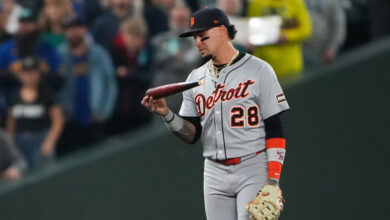The Cubs Would be Great if They Could Just Play 5-Inning Games
I think I’ve discovered a way to bring a World Series title to Chicago: eliminate the 1st, 2nd, 6th, and 7th innings from the official scorebooks. Mind you, I’m not advocating reducing games to 5 innings. Rather, I’m asserting that they continue to play 9 innings to preserve the game’s integrity, but only count 5 of them.
As crazy as it sounds, this might be the best way to bring a title to the North Side in short order. I mean, given the way the Cubs open games and then have a tendency to completely soil the bed in the late middle, it couldn’t hurt.
Just take a look at this chart of the Cubs’ runs allowed by inning this year, courtesy of Cleanup Hitter (high ranks are bad, by the way):
| Inning | 1 | 2 | 3 | 4 | 5 | 6 | 7 | 8 | 9 |
| Runs (rank) | 15 (t11) | 17 (2) | 4 (29) | 11 (t19) | 7 (t26) | 18 (5) | 14 (t9) | 4 (t29) | 8 (t10) |
| % of total | 15.31 | 17.35 | 4.08 | 11.22 | 7.14 | 18.37 | 14.29 | 4.08 | 8.16 |
| 2015 MLB avg | 13.27 | 9.31 | 11.68 | 12.11 | 11.99 | 11.43 | 11.06 | 9.87 | 7.29 |
| 2014 MLB avg | 11.97 | 10.14 | 10.76 | 11.72 | 11.97 | 11.77 | 11.21 | 10.2 | 8.04 |
Were run scoring to be divided equally among all innings, you’d see about 11% in each frame (allowing for a little deviation due to extra innings). For the most part, that tends to be true in reality, though the 9th inning is understandably lower.
2014 doesn’t have any bearing on the conversation, but I wanted to include those stats as a control group of sorts since this season is still too new to yield any real conclusions about overall trends in the game. But as we compare innings, the Cubs clearly stick out in the four I advocated cutting.
I had mentioned in this morning’s Rundown that they need to fix the 6th, in which they allow nearly 47% more runs than league average. But in looking over this chart, it appears as though the 2nd inning is an even bigger problem; the Cubs have allowed nearly 71% more runs than the average, 2nd-worst in baseball.
The problems later in the game are certainly real, but the Cubs get shaky there because they’re building on a foundation that is less than solid. Allowing early runs means higher pitch counts, which means less chance for the starter to go deep into the game. It also means there’s a greater need to create offense, thus necessitating the removal of the starter for a pinch hitter.
The 2nd inning also looms larger because while we can sort of wave a hand at the performance of relievers and say “just wait ’til Grimm and Ramirez get back,” you can’t do the same for your starters. Of course, you could always throw the old “regression to the mean” defense out there.
While it’s perhaps a bit too simplistic, there is some merit to this concept though. Over the last 5 seasons, on average, Cubs pitchers have allowed only 9.7% of their runs for the season in the 2nd inning. Different staffs, to be sure, but still below the league average of 10.2% over that same timeframe.
Because it’s so early, it’s easy to believe this trend will indeed correct itself naturally. We’re only talking about 5 runs or so, a total that will dissolve unseen into the ocean of time by the time the season is done. The main culprits thus far have been Kyle Hendricks and Jason Hammel, each of whom has allowed 5 2nd-inning runs thus far.
So, basically, I’m saying that the Cubs will be fine if they can just stop digging early holes and giving games away late. Wow, what a groundbreaking conclusion! Rather than try to state the obvious in terms of a general concept though, I found it quite informative to have a visual representation of how Cubs pitchers have performed this season.
It’s become a bit too easy to pick on the bullpen, though that unit has deserved much of the criticism it’s received. However, injuries and being put in uncomfortable positions (like the back of a Volkswagen) haven’t really helped matters.
Absent any surprise changes to the rules of the game in the coming days, it looks like the Cubs are going to need to figure out a way to string together more than 5 good innings if they hope to stay in the race for a while longer. In order to do that, they’re going to need better early performances from the starters and late ones from relievers.
Given the inconsistency in the relief corps, I’d say the onus is on the starters to up their game at this point. While he was unscathed in the 2nd last night, Travis Wood didn’t do anyone any favors by getting touched up for 4 early runs after having been staked to a 5-0 lead. The ‘pen didn’t do its part either, but I’m trying to spread the blame around a little.
I’m at a loss in terms of real solutions though, so I’m just going to hope regression to bring the starters back to normal and that Grimm and Ramirez get back soon.

